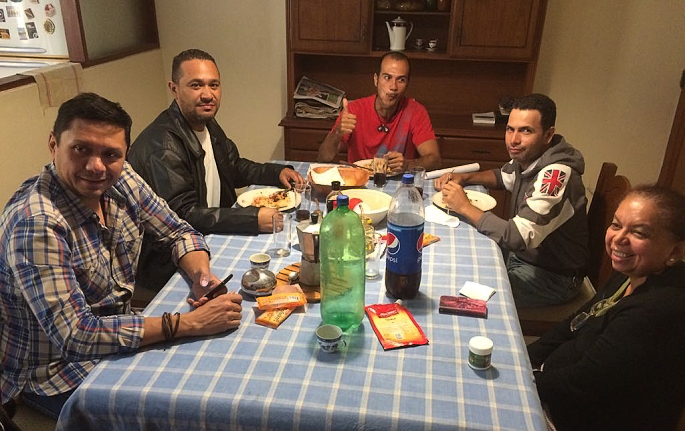
27 Aug 2018 | Focolare Worldwide
“According to reliable sources, on the 11th of August alone 5,100 Venezuelans crossed the border between Ecuador and Peru, a record that exceeds last May when in 3,700 new arrivals arrived in one day. This is why Ecuador has declared a state of migratory emergency.” Roggero, born in Venezuela of Italian parents, knows Latin America where he lived for almost 40 years before moving to the Peruvian capital in 2015. Not only are Brazil, Colombia, Ecuador and Peru grappling with an epochal exodus, but also more distant countries like Chile, Argentina and even Uruguay and, according to many observers, it threatens to provoke one of the greatest humanitarian crises in recent decades. The new rules of entry into Ecuador and Peru a few days ago imposed on Venezuelan citizens to show a passport, which is impossible to obtain these days. “This is something hard to understand if you aren’t experiencing it for yourself. The Venezuelans who have fled to Peru may have already reached the quota of 400 thousand people. They fled from a country in the grip of a very serious crisis where everything is lacking, and I’m here to find a job and keep together the rest of the family that’s been left in Venezuela at the cost of great sacrifice. They are willing to do anything, they often go hungry; they spend even 3-4 hours a day on the bus to earn just a few dollars. Many sleep on the floor and suffer from cold because they do not even have a blanket and shower with cold water. But at least they know that the family members who went to stay in Venezuela (wife, children, brothers, grandparents …) have a roof over their heads and can somehow survive with the few dollars that come from abroad.  Meanwhile, the Focolare community has been trying to welcome people, relatives or friends, who keep arriving. “What is important for us,” says Silvano, is that they find a family atmosphere. Then, if we can share some food, jackets, medicines, a blanket or some help in obtaining a temporary residence permit, even better. On August 12th we met for the third time in the Lima focolare with the Fiore Center one of our operations offices. We were 23 people, two thirds of whom were Venezuelan. First, those who wanted could attend Mass. Then we offered lunch on two large tables. Before leaving, we saw a video presentation of Chiara Lubich, because most of the people did not know the Movement. An always moving moment is when we distribute clothes that the local community collects for us. We also laughed a lot when one of the people was wearing his coat, which he picked up by accident. This unusual happiness concealed some very harsh realities and all kinds of painful stories of the journey from Venezuela. Talking and listening to them has been a liberation for them. To somebody in emergency we could offer, in the meantime, some washing machine tours. To some others we were able to offer a few turns of our washing machines for their laundry. Two rocker friends of one of the guests showed up by chance and left deeply moved by the relationship they had seen among all of us. They called us “quality people”. It seems that this definition, in the rocket world, at least in Venezuela, is the highest possible compliment. And it was not over yet: from the one you would least expect came an invitation to say a final prayer. All of us in a circle joined hands and offered a prayer that was very meaningful! That same evening we learned that the UN estimates that 2.3 million Venezuelans have already fled the country since the beginning of the crisis. So we still have a lot of work to do – and for quite a while. “
Meanwhile, the Focolare community has been trying to welcome people, relatives or friends, who keep arriving. “What is important for us,” says Silvano, is that they find a family atmosphere. Then, if we can share some food, jackets, medicines, a blanket or some help in obtaining a temporary residence permit, even better. On August 12th we met for the third time in the Lima focolare with the Fiore Center one of our operations offices. We were 23 people, two thirds of whom were Venezuelan. First, those who wanted could attend Mass. Then we offered lunch on two large tables. Before leaving, we saw a video presentation of Chiara Lubich, because most of the people did not know the Movement. An always moving moment is when we distribute clothes that the local community collects for us. We also laughed a lot when one of the people was wearing his coat, which he picked up by accident. This unusual happiness concealed some very harsh realities and all kinds of painful stories of the journey from Venezuela. Talking and listening to them has been a liberation for them. To somebody in emergency we could offer, in the meantime, some washing machine tours. To some others we were able to offer a few turns of our washing machines for their laundry. Two rocker friends of one of the guests showed up by chance and left deeply moved by the relationship they had seen among all of us. They called us “quality people”. It seems that this definition, in the rocket world, at least in Venezuela, is the highest possible compliment. And it was not over yet: from the one you would least expect came an invitation to say a final prayer. All of us in a circle joined hands and offered a prayer that was very meaningful! That same evening we learned that the UN estimates that 2.3 million Venezuelans have already fled the country since the beginning of the crisis. So we still have a lot of work to do – and for quite a while. “
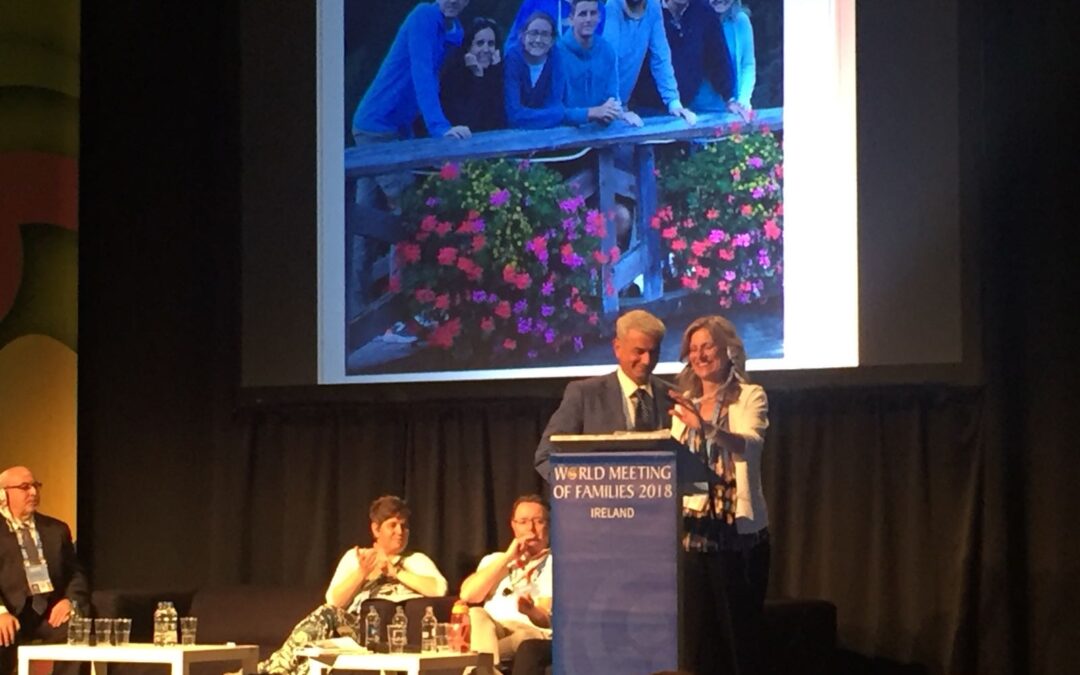
26 Aug 2018 | Focolare Worldwide
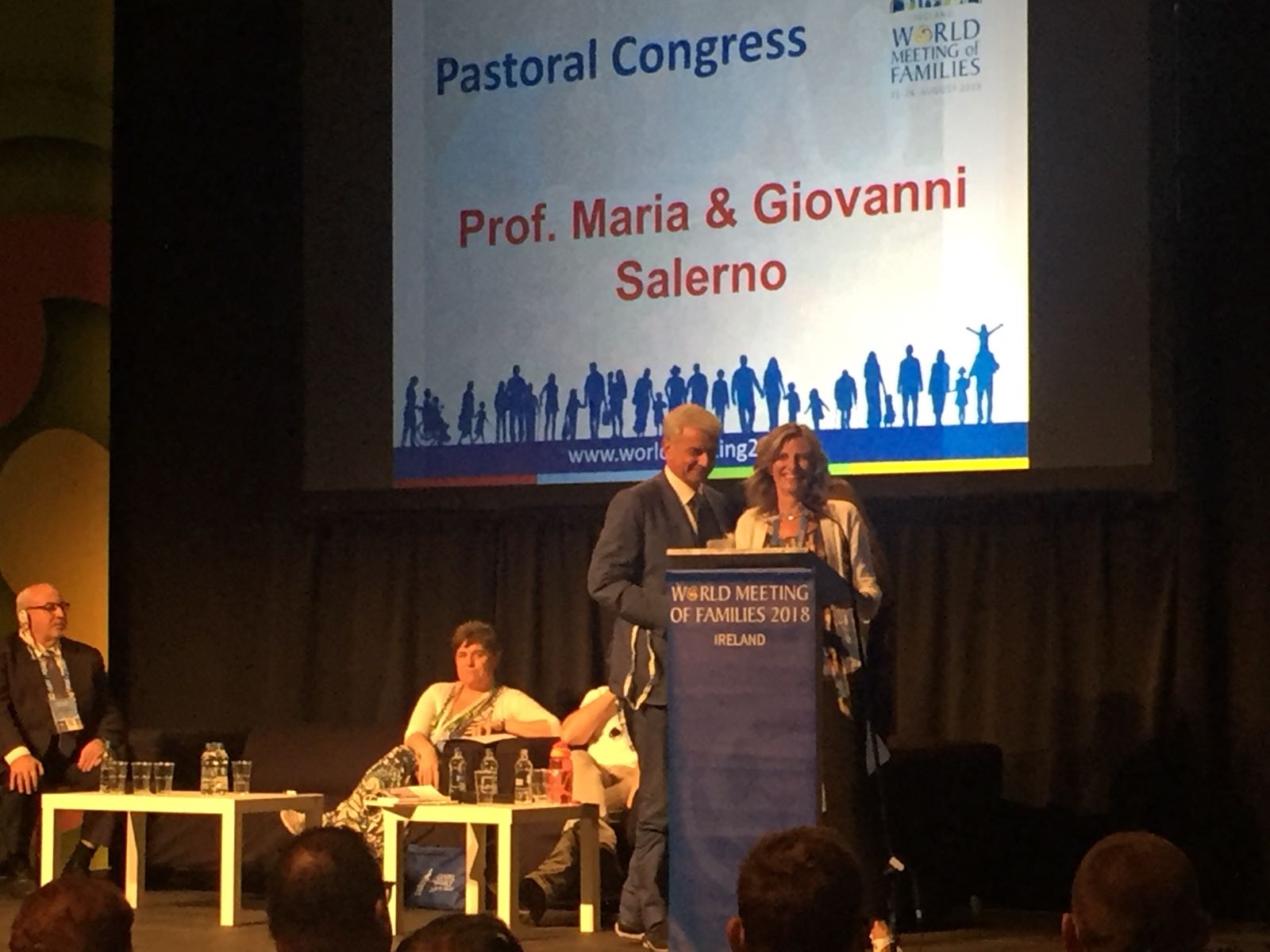 Married for 31 years, with five children and a granddaughter on the way, Gianni and Maria Salerno would have many stories to tell, along with practical advice on raising children. But for their panel on “Joy and the challenges of parents raising children in today’s world,” which is the main topic of the meeting in Dublin, they bring to the table the patrimony of the life and experience that has matured for many years in the Focolare’s New Families Movement. Some of the topics that will be discussed are: the role of technology in the family, the relationship with the faith, the multiple connections with work, the economy and environment. It is a “family of families,” which draws on the spirituality of unity of Chiara Lubich as a compass that marks north on the sometimes wearisome journey of life. “We’d like to emphasize several “key terms” that seem useful for the relationship with our children and are liveable anywhere in every the country of the world, regardless of culture. The first is detachment. Our children are not ours, they’re God’s children. This attitude allows us to seek what is best for them, to respect their freedom and to discover God’s plan for their happiness. Another important word is accompany, to them feel our nearness so that they can face difficulties without feeling all alone. Thus they can learn commitment, through an ongoing training of the will. Then, there is a phrase that has always been fundamental in our experience and in the experience of many other families from around the world with whom we are in contact: start again. When you make a mistake, when there’s a problem, or love is lacking, we can always put a period and begin again, asking forgiveness if we’ve overdone it when correcting one of our children, which for parents is often an opportunity to unload rather than educate.”
Married for 31 years, with five children and a granddaughter on the way, Gianni and Maria Salerno would have many stories to tell, along with practical advice on raising children. But for their panel on “Joy and the challenges of parents raising children in today’s world,” which is the main topic of the meeting in Dublin, they bring to the table the patrimony of the life and experience that has matured for many years in the Focolare’s New Families Movement. Some of the topics that will be discussed are: the role of technology in the family, the relationship with the faith, the multiple connections with work, the economy and environment. It is a “family of families,” which draws on the spirituality of unity of Chiara Lubich as a compass that marks north on the sometimes wearisome journey of life. “We’d like to emphasize several “key terms” that seem useful for the relationship with our children and are liveable anywhere in every the country of the world, regardless of culture. The first is detachment. Our children are not ours, they’re God’s children. This attitude allows us to seek what is best for them, to respect their freedom and to discover God’s plan for their happiness. Another important word is accompany, to them feel our nearness so that they can face difficulties without feeling all alone. Thus they can learn commitment, through an ongoing training of the will. Then, there is a phrase that has always been fundamental in our experience and in the experience of many other families from around the world with whom we are in contact: start again. When you make a mistake, when there’s a problem, or love is lacking, we can always put a period and begin again, asking forgiveness if we’ve overdone it when correcting one of our children, which for parents is often an opportunity to unload rather than educate.” 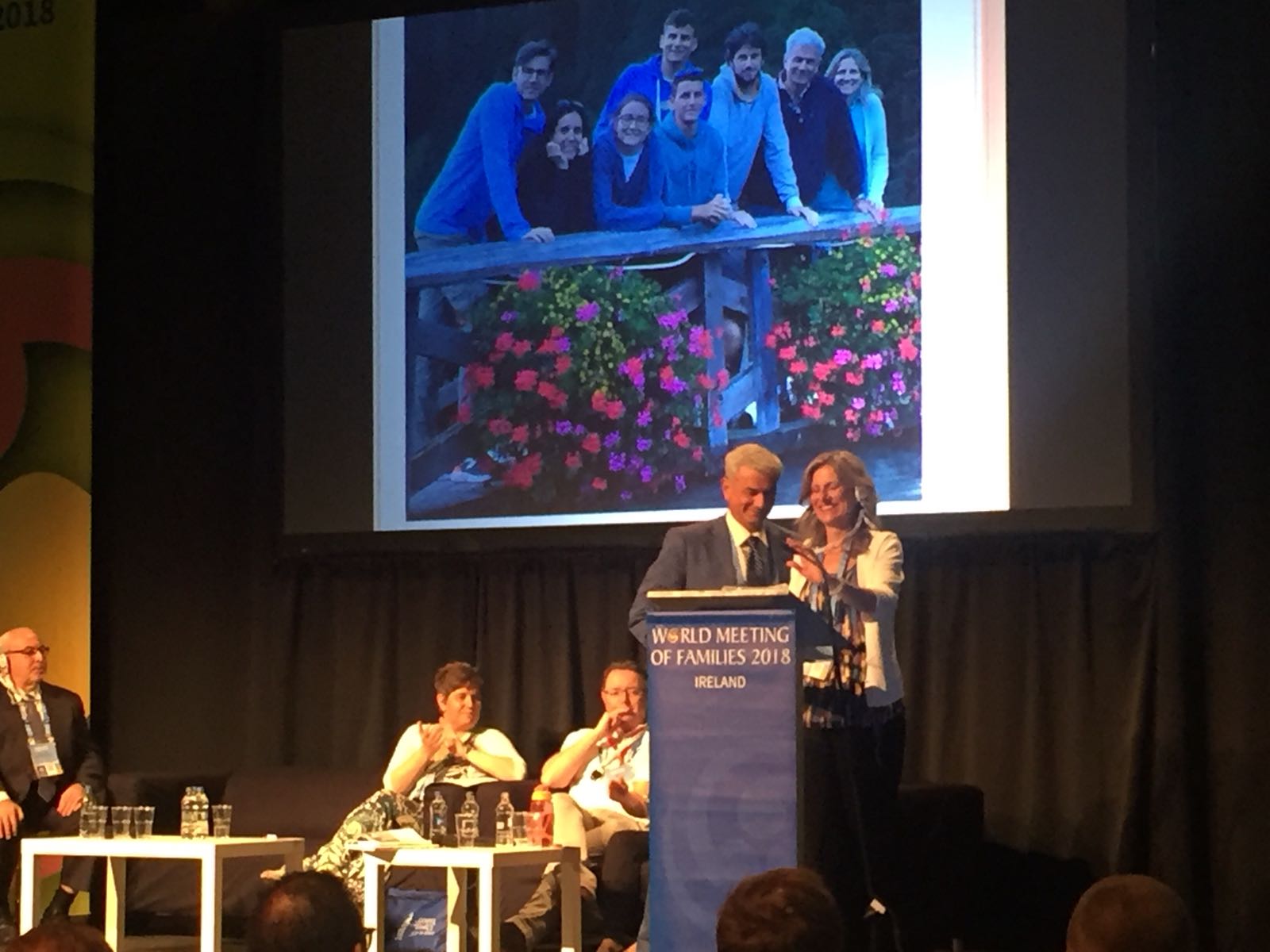 “We should always try to immerse ourselves in what our children are going through. We use a popular phrase to express our desire to listen deeply and be open: walk in their shoes for a while before giving any quick answers. Example, sharing and dialogue are indispensable in a family. You have to be able to talk about anything in a family and parents are the ones who must prove it, using their antennas to catch the non-verbal messages that children send – especially teenagers – which are often provocations. Then we need to give our time to them. How much effort this involves, perhaps at night after a long day’s work, especially when our thoughts don’t coincide. We have to allow ourselves to challenge them without any fear of them or their ‘world,’ even when worries of all kinds arise within us: about their health, the friends they choose, school and the future. When this happens we try to hold on to a valuable piece of advice: be occupied, not preoccupied so as to avoid letting our anxiety make them even more insecure or less free. In the end, what we can always do is to pray for them, entrusting them to God’s love. There are cases in which children become rebellious and reject the relationship with the parents, taking on violent behaviours, making questionable choices that are sometimes grave and serious. This causes suffering and destabilizes the family. The wound of having failed at educating our children really burns and makes us wonder: where did we go wrong? Also in these cases we have to remember that we are parents forever and that the door of our hearts is always open. It’s not easy, but we can follow the example of Jesus crucified and abandoned who offered his pain and transformed it into Love. Like him, we can also consume our pain by continuing to love our children concretely, along with all the other neighbours who come our way, in the awareness that, in the end, Love will triumph.”
“We should always try to immerse ourselves in what our children are going through. We use a popular phrase to express our desire to listen deeply and be open: walk in their shoes for a while before giving any quick answers. Example, sharing and dialogue are indispensable in a family. You have to be able to talk about anything in a family and parents are the ones who must prove it, using their antennas to catch the non-verbal messages that children send – especially teenagers – which are often provocations. Then we need to give our time to them. How much effort this involves, perhaps at night after a long day’s work, especially when our thoughts don’t coincide. We have to allow ourselves to challenge them without any fear of them or their ‘world,’ even when worries of all kinds arise within us: about their health, the friends they choose, school and the future. When this happens we try to hold on to a valuable piece of advice: be occupied, not preoccupied so as to avoid letting our anxiety make them even more insecure or less free. In the end, what we can always do is to pray for them, entrusting them to God’s love. There are cases in which children become rebellious and reject the relationship with the parents, taking on violent behaviours, making questionable choices that are sometimes grave and serious. This causes suffering and destabilizes the family. The wound of having failed at educating our children really burns and makes us wonder: where did we go wrong? Also in these cases we have to remember that we are parents forever and that the door of our hearts is always open. It’s not easy, but we can follow the example of Jesus crucified and abandoned who offered his pain and transformed it into Love. Like him, we can also consume our pain by continuing to love our children concretely, along with all the other neighbours who come our way, in the awareness that, in the end, Love will triumph.”
23 Aug 2018 | Focolare Worldwide
The flood in Kerala, southern State of India, has wrought more than 400 victims and about 750,000 displaced. The rescue and assistance operations are brought ahead amid great difficulties due to the inaccessibility of some areas struck. In some cases, they were forced to throw food and water from the helicopters because the streets and bridges were destroyed by the devastating floods. The local Focolare communities writes: “We have returned from Trichy (about 300 km from Kerala), where the Mariapolis was held with the members of the Word of Life groups, spread out within a range of 120 km. But our hearts are with the people of Kerala struck by strong rains. We are still in the monsoon period, with hot winds that cause these tropical typhoons. For all we know, the members of the Movement are fine. A retreat had been programmed for the priests in Trivandrum (south Kerala), but we had to cancel it because it is not safe to travel and many of the priests who booked are involved in the tragedy. During the weekend, our local communities were busy collecting foodstuffs and prime commodities to be sent to the struck areas. We are counting on your prayers.” Also Pope Francis prayed for the victims so that “our brothers there may have our solidarity and the concrete support of the community.”
23 Aug 2018 | Focolare Worldwide
“We are following closely the events surrounding the Coast Guard Ship ‘Ubaldi Diciotti‘, which arrived in Catania and is in two-days stand-off with 177 people on board who are not being allowed to disembark. The umpteenth case, unfortunately, that over the past few months has put a strain on the culture of hospitality that has always been the mark of the Italian people, “says the press release of 22 August signed by Rosalba Poli and Andrea Goller who are leaders of the Focolare Movement in Italy. They support “the need for shared paths at a European level in the search for non-improvised solutions”. But they highlight “the great concern for human events such as people fleeing from hunger, war and death”. And they ask “that the human dignity of those who are in the same condition recognized either in their countries of origin, and in the countries through which they are travelling, including ours where they have now landed.” The communiqué concludes with an appeal to politicians “from all backgrounds; that they put aside disputes between sides and particular interests, and collaborate in the name of our common humanity, which comes before any other distinction or separateness”. See also: “A-mare (o amare) il prossimo” (in Italian)
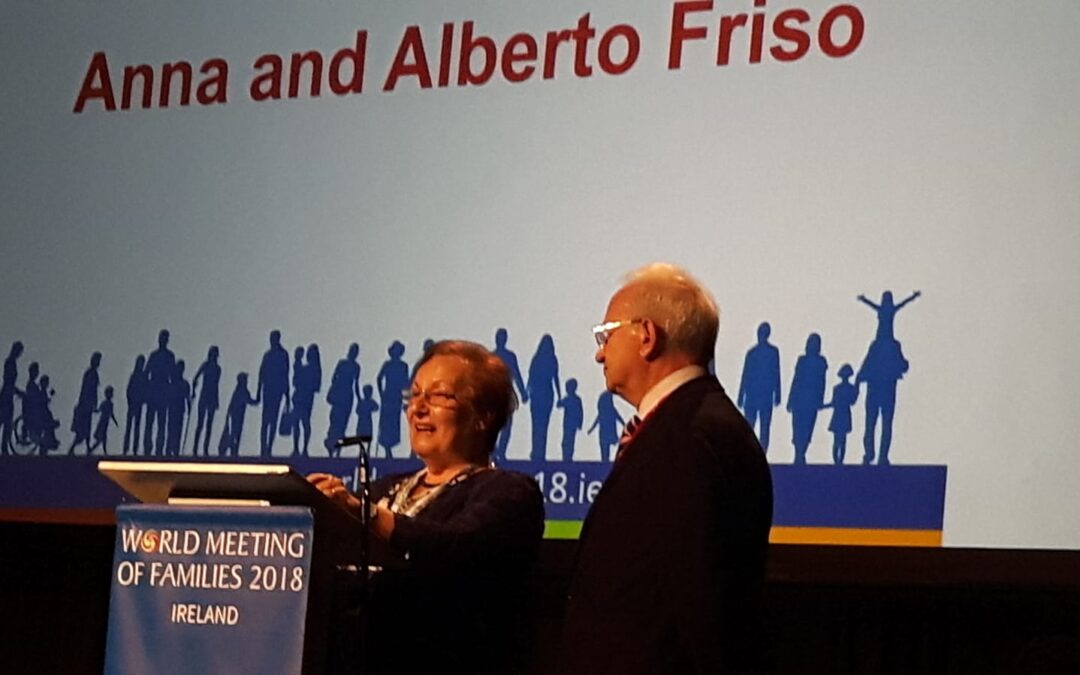
22 Aug 2018 | Focolare Worldwide
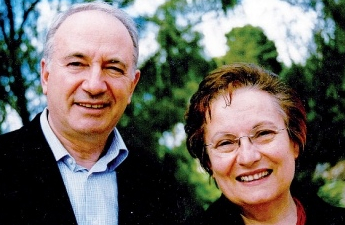 Fifty years ago we ourselves did not know the origins of our love. We were content to know that we had undertaken a journey which had no end in sight, amazed that our differences could be so balanced, so enjoyable and complementary, so much so that although we were different we felt we were wonderfully equal. We felt we were ready for everything, convinced that no one loved in the way we loved, because we had invented love. Less than a year after that wonderful ‘yes,’ some clouds already began to darken our horizon. Work, tiredness, routine… Yes, we all know that being in love ends at some point. It was then that someone revealed to us that God is the source of every love. God who is love. We should have known all this, because when we pronounced our wedding vows He was there with us and from then on he had even dwelt amongst us. But we did not realise what a gift we had, we did not know what a gift we had, we did not know his presence was part of the package! We realized afterwards, he gives the whole of himself to us asking in return just a small, agreeable, daily contribution: that we love one another with his very own love. Does being in love come to an end? [Yes but] love needs to take its place. Because if faith is, so to speak, an interior virtue, love is its outward, visible fulfilment. Love is greater than anything else: greater than faith, greater than hope. In the Next Life, there is no more need for these two virtues. On the other hand, love remains in Paradise. Love makes of the two one body. Which means one reality that is untouchable and indissoluble. It is a ‘we’’ that is open to the Absolute. Love must reach the paradox of knowing how to become nothing in order to put yourself in the other person’s shoes. Only in this way will our love mirror its original plan which comes forth from nothing less than the Trinity.
Fifty years ago we ourselves did not know the origins of our love. We were content to know that we had undertaken a journey which had no end in sight, amazed that our differences could be so balanced, so enjoyable and complementary, so much so that although we were different we felt we were wonderfully equal. We felt we were ready for everything, convinced that no one loved in the way we loved, because we had invented love. Less than a year after that wonderful ‘yes,’ some clouds already began to darken our horizon. Work, tiredness, routine… Yes, we all know that being in love ends at some point. It was then that someone revealed to us that God is the source of every love. God who is love. We should have known all this, because when we pronounced our wedding vows He was there with us and from then on he had even dwelt amongst us. But we did not realise what a gift we had, we did not know what a gift we had, we did not know his presence was part of the package! We realized afterwards, he gives the whole of himself to us asking in return just a small, agreeable, daily contribution: that we love one another with his very own love. Does being in love come to an end? [Yes but] love needs to take its place. Because if faith is, so to speak, an interior virtue, love is its outward, visible fulfilment. Love is greater than anything else: greater than faith, greater than hope. In the Next Life, there is no more need for these two virtues. On the other hand, love remains in Paradise. Love makes of the two one body. Which means one reality that is untouchable and indissoluble. It is a ‘we’’ that is open to the Absolute. Love must reach the paradox of knowing how to become nothing in order to put yourself in the other person’s shoes. Only in this way will our love mirror its original plan which comes forth from nothing less than the Trinity. 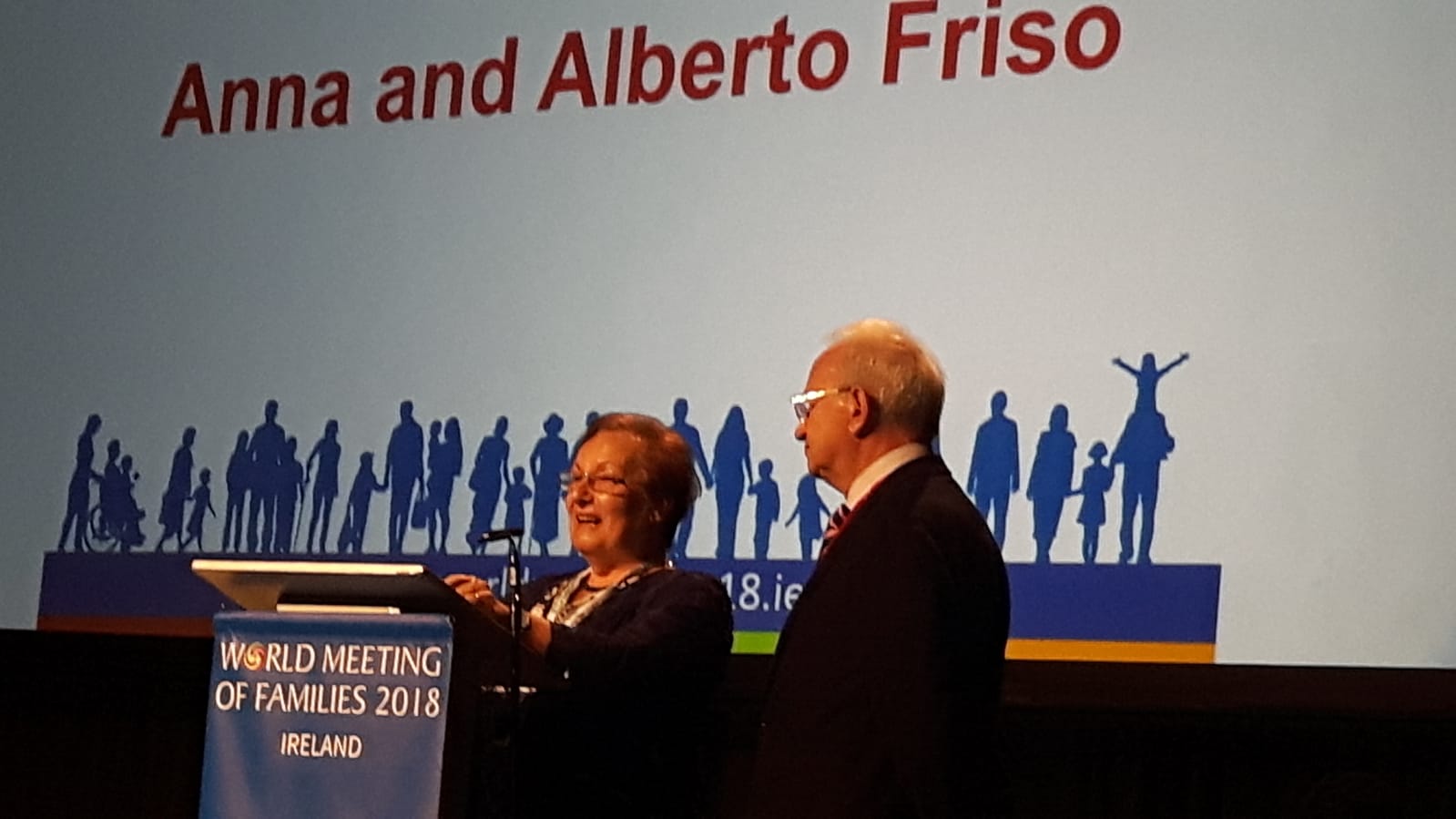 The ‘we’ formed by the couple is the first and living fruit of our love. The complimentarity of male and female expresses itself in a thousand daily gestures of mutual service and tenderness, up to the fullness of bodily intimacy. It is also expressed in sharing space, time and tasks. [The ‘we’ formed by the couple] knows how to go out first of all to their children and then towards others. The ‘we’ is the couple’s characteristic way of evangelizing, placing themselves before others as one example among many, and never as a model of the ideal family, which does not exist. Love is our unique opportunity, even if we feel that we are not perfect, even if we feel we have failed in everything. What matters is to believe that in the present moment we are the right person for the other; and that is what we are in the moment we decide to love them as they are, without any expectation that they will change, putting into action the three ‘magic’ words which Pope Francis teaches: please, thank you, sorry. It is said that today the family is going through the most tragic of all crises. Let us not regret the good old days, if ever such days existed. It is in the family that life is kindled. It is there that we learn to share, to rejoice, to suffer, to know sickness and to face death. Love makes it the most concrete of utopias. Families that welcome children even if disabled, others who adopt them precisely because they are disabled, those who welcome elderly parents, those who open their homes to migrants, those who help their children recover from addiction. In the fifty or more years that we have been together, life has taught us many things. We have cried and we partied. So many times we were wrong, but with his grace and forgiveness, we have started again. Putting our love again and again into the hands of God, who is our love, he has never hesitated, like at Cana to change our poor water into wonderful wine, making it wonderfully available also to those who are around us. And now, despite the fact that over the years our passion has diminished and the limitation of our characters are more evident, we continue trustfully to draw water from God’s unending source, happy to feel we are companions and accomplices right to the end.
The ‘we’ formed by the couple is the first and living fruit of our love. The complimentarity of male and female expresses itself in a thousand daily gestures of mutual service and tenderness, up to the fullness of bodily intimacy. It is also expressed in sharing space, time and tasks. [The ‘we’ formed by the couple] knows how to go out first of all to their children and then towards others. The ‘we’ is the couple’s characteristic way of evangelizing, placing themselves before others as one example among many, and never as a model of the ideal family, which does not exist. Love is our unique opportunity, even if we feel that we are not perfect, even if we feel we have failed in everything. What matters is to believe that in the present moment we are the right person for the other; and that is what we are in the moment we decide to love them as they are, without any expectation that they will change, putting into action the three ‘magic’ words which Pope Francis teaches: please, thank you, sorry. It is said that today the family is going through the most tragic of all crises. Let us not regret the good old days, if ever such days existed. It is in the family that life is kindled. It is there that we learn to share, to rejoice, to suffer, to know sickness and to face death. Love makes it the most concrete of utopias. Families that welcome children even if disabled, others who adopt them precisely because they are disabled, those who welcome elderly parents, those who open their homes to migrants, those who help their children recover from addiction. In the fifty or more years that we have been together, life has taught us many things. We have cried and we partied. So many times we were wrong, but with his grace and forgiveness, we have started again. Putting our love again and again into the hands of God, who is our love, he has never hesitated, like at Cana to change our poor water into wonderful wine, making it wonderfully available also to those who are around us. And now, despite the fact that over the years our passion has diminished and the limitation of our characters are more evident, we continue trustfully to draw water from God’s unending source, happy to feel we are companions and accomplices right to the end.
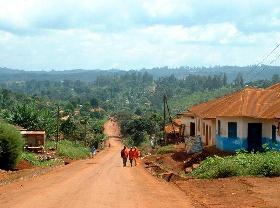
22 Aug 2018 | Focolare Worldwide

 Meanwhile, the Focolare community has been trying to welcome people, relatives or friends, who keep arriving. “What is important for us,” says Silvano, is that they find a family atmosphere. Then, if we can share some food, jackets, medicines, a blanket or some help in obtaining a temporary residence permit, even better. On August 12th we met for the third time in the Lima focolare with the Fiore Center one of our operations offices. We were 23 people, two thirds of whom were Venezuelan. First, those who wanted could attend Mass. Then we offered lunch on two large tables. Before leaving, we saw a video presentation of Chiara Lubich, because most of the people did not know the Movement. An always moving moment is when we distribute clothes that the local community collects for us. We also laughed a lot when one of the people was wearing his coat, which he picked up by accident. This unusual happiness concealed some very harsh realities and all kinds of painful stories of the journey from Venezuela. Talking and listening to them has been a liberation for them. To somebody in emergency we could offer, in the meantime, some washing machine tours. To some others we were able to offer a few turns of our washing machines for their laundry. Two rocker friends of one of the guests showed up by chance and left deeply moved by the relationship they had seen among all of us. They called us “quality people”. It seems that this definition, in the rocket world, at least in Venezuela, is the highest possible compliment. And it was not over yet: from the one you would least expect came an invitation to say a final prayer. All of us in a circle joined hands and offered a prayer that was very meaningful! That same evening we learned that the UN estimates that 2.3 million Venezuelans have already fled the country since the beginning of the crisis. So we still have a lot of work to do – and for quite a while. “
Meanwhile, the Focolare community has been trying to welcome people, relatives or friends, who keep arriving. “What is important for us,” says Silvano, is that they find a family atmosphere. Then, if we can share some food, jackets, medicines, a blanket or some help in obtaining a temporary residence permit, even better. On August 12th we met for the third time in the Lima focolare with the Fiore Center one of our operations offices. We were 23 people, two thirds of whom were Venezuelan. First, those who wanted could attend Mass. Then we offered lunch on two large tables. Before leaving, we saw a video presentation of Chiara Lubich, because most of the people did not know the Movement. An always moving moment is when we distribute clothes that the local community collects for us. We also laughed a lot when one of the people was wearing his coat, which he picked up by accident. This unusual happiness concealed some very harsh realities and all kinds of painful stories of the journey from Venezuela. Talking and listening to them has been a liberation for them. To somebody in emergency we could offer, in the meantime, some washing machine tours. To some others we were able to offer a few turns of our washing machines for their laundry. Two rocker friends of one of the guests showed up by chance and left deeply moved by the relationship they had seen among all of us. They called us “quality people”. It seems that this definition, in the rocket world, at least in Venezuela, is the highest possible compliment. And it was not over yet: from the one you would least expect came an invitation to say a final prayer. All of us in a circle joined hands and offered a prayer that was very meaningful! That same evening we learned that the UN estimates that 2.3 million Venezuelans have already fled the country since the beginning of the crisis. So we still have a lot of work to do – and for quite a while. “


 “We should always try to immerse ourselves in what our children are going through. We use a popular phrase to express our desire to listen deeply and be open: walk in their shoes for a while before giving any quick answers. Example, sharing and dialogue are indispensable in a family. You have to be able to talk about anything in a family and parents are the ones who must prove it, using their antennas to catch the non-verbal messages that children send – especially teenagers – which are often provocations. Then we need to give our time to them. How much effort this involves, perhaps at night after a long day’s work, especially when our thoughts don’t coincide. We have to allow ourselves to challenge them without any fear of them or their ‘world,’ even when worries of all kinds arise within us: about their health, the friends they choose, school and the future. When this happens we try to hold on to a valuable piece of advice: be occupied, not preoccupied so as to avoid letting our anxiety make them even more insecure or less free. In the end, what we can always do is to pray for them, entrusting them to God’s love. There are cases in which children become rebellious and reject the relationship with the parents, taking on violent behaviours, making questionable choices that are sometimes grave and serious. This causes suffering and destabilizes the family. The wound of having failed at educating our children really burns and makes us wonder: where did we go wrong? Also in these cases we have to remember that we are parents forever and that the door of our hearts is always open. It’s not easy, but we can follow the example of
“We should always try to immerse ourselves in what our children are going through. We use a popular phrase to express our desire to listen deeply and be open: walk in their shoes for a while before giving any quick answers. Example, sharing and dialogue are indispensable in a family. You have to be able to talk about anything in a family and parents are the ones who must prove it, using their antennas to catch the non-verbal messages that children send – especially teenagers – which are often provocations. Then we need to give our time to them. How much effort this involves, perhaps at night after a long day’s work, especially when our thoughts don’t coincide. We have to allow ourselves to challenge them without any fear of them or their ‘world,’ even when worries of all kinds arise within us: about their health, the friends they choose, school and the future. When this happens we try to hold on to a valuable piece of advice: be occupied, not preoccupied so as to avoid letting our anxiety make them even more insecure or less free. In the end, what we can always do is to pray for them, entrusting them to God’s love. There are cases in which children become rebellious and reject the relationship with the parents, taking on violent behaviours, making questionable choices that are sometimes grave and serious. This causes suffering and destabilizes the family. The wound of having failed at educating our children really burns and makes us wonder: where did we go wrong? Also in these cases we have to remember that we are parents forever and that the door of our hearts is always open. It’s not easy, but we can follow the example of 
 Fifty years ago we ourselves did not know the origins of our love. We were content to know that we had undertaken a journey which had no end in sight, amazed that our differences could be so balanced, so enjoyable and complementary, so much so that although we were different we felt we were wonderfully equal. We felt we were ready for everything, convinced that no one loved in the way we loved, because we had invented love. Less than a year after that wonderful ‘yes,’ some clouds already began to darken our horizon. Work, tiredness, routine… Yes, we all know that being in love ends at some point. It was then that someone revealed to us that God is the source of every love. God who is love. We should have known all this, because when we pronounced our wedding vows He was there with us and from then on he had even dwelt amongst us. But we did not realise what a gift we had, we did not know what a gift we had, we did not know his presence was part of the package! We realized afterwards, he gives the whole of himself to us asking in return just a small, agreeable, daily contribution: that we love one another with his very own love. Does being in love come to an end? [Yes but] love needs to take its place. Because if faith is, so to speak, an interior virtue, love is its outward, visible fulfilment. Love is greater than anything else: greater than faith, greater than hope. In the Next Life, there is no more need for these two virtues. On the other hand, love remains in Paradise. Love makes of the two one body. Which means one reality that is untouchable and indissoluble. It is a ‘we’’ that is open to the Absolute. Love must reach the paradox of knowing how to become nothing in order to put yourself in the other person’s shoes. Only in this way will our love mirror its original plan which comes forth from nothing less than the Trinity.
Fifty years ago we ourselves did not know the origins of our love. We were content to know that we had undertaken a journey which had no end in sight, amazed that our differences could be so balanced, so enjoyable and complementary, so much so that although we were different we felt we were wonderfully equal. We felt we were ready for everything, convinced that no one loved in the way we loved, because we had invented love. Less than a year after that wonderful ‘yes,’ some clouds already began to darken our horizon. Work, tiredness, routine… Yes, we all know that being in love ends at some point. It was then that someone revealed to us that God is the source of every love. God who is love. We should have known all this, because when we pronounced our wedding vows He was there with us and from then on he had even dwelt amongst us. But we did not realise what a gift we had, we did not know what a gift we had, we did not know his presence was part of the package! We realized afterwards, he gives the whole of himself to us asking in return just a small, agreeable, daily contribution: that we love one another with his very own love. Does being in love come to an end? [Yes but] love needs to take its place. Because if faith is, so to speak, an interior virtue, love is its outward, visible fulfilment. Love is greater than anything else: greater than faith, greater than hope. In the Next Life, there is no more need for these two virtues. On the other hand, love remains in Paradise. Love makes of the two one body. Which means one reality that is untouchable and indissoluble. It is a ‘we’’ that is open to the Absolute. Love must reach the paradox of knowing how to become nothing in order to put yourself in the other person’s shoes. Only in this way will our love mirror its original plan which comes forth from nothing less than the Trinity.  The ‘we’ formed by the couple is the first and living fruit of our love. The complimentarity of male and female expresses itself in a thousand daily gestures of mutual service and tenderness, up to the fullness of bodily intimacy. It is also expressed in sharing space, time and tasks. [The ‘we’ formed by the couple] knows how to go out first of all to their children and then towards others. The ‘we’ is the couple’s characteristic way of evangelizing, placing themselves before others as one example among many, and never as a model of the ideal family, which does not exist. Love is our unique opportunity, even if we feel that we are not perfect, even if we feel we have failed in everything. What matters is to believe that in the present moment we are the right person for the other; and that is what we are in the moment we decide to love them as they are, without any expectation that they will change, putting into action the three ‘magic’ words which Pope Francis teaches: please, thank you, sorry. It is said that today the family is going through the most tragic of all crises. Let us not regret the good old days, if ever such days existed. It is in the family that life is kindled. It is there that we learn to share, to rejoice, to suffer, to know sickness and to face death. Love makes it the most concrete of utopias. Families that welcome children even if disabled, others who adopt them precisely because they are disabled, those who welcome elderly parents, those who open their homes to migrants, those who help their children recover from addiction. In the fifty or more years that we have been together, life has taught us many things. We have cried and we partied. So many times we were wrong, but with his grace and forgiveness, we have started again. Putting our love again and again into the hands of God, who is our love, he has never hesitated, like at Cana to change our poor water into wonderful wine, making it wonderfully available also to those who are around us. And now, despite the fact that over the years our passion has diminished and the limitation of our characters are more evident, we continue trustfully to draw water from God’s unending source, happy to feel we are companions and accomplices right to the end.
The ‘we’ formed by the couple is the first and living fruit of our love. The complimentarity of male and female expresses itself in a thousand daily gestures of mutual service and tenderness, up to the fullness of bodily intimacy. It is also expressed in sharing space, time and tasks. [The ‘we’ formed by the couple] knows how to go out first of all to their children and then towards others. The ‘we’ is the couple’s characteristic way of evangelizing, placing themselves before others as one example among many, and never as a model of the ideal family, which does not exist. Love is our unique opportunity, even if we feel that we are not perfect, even if we feel we have failed in everything. What matters is to believe that in the present moment we are the right person for the other; and that is what we are in the moment we decide to love them as they are, without any expectation that they will change, putting into action the three ‘magic’ words which Pope Francis teaches: please, thank you, sorry. It is said that today the family is going through the most tragic of all crises. Let us not regret the good old days, if ever such days existed. It is in the family that life is kindled. It is there that we learn to share, to rejoice, to suffer, to know sickness and to face death. Love makes it the most concrete of utopias. Families that welcome children even if disabled, others who adopt them precisely because they are disabled, those who welcome elderly parents, those who open their homes to migrants, those who help their children recover from addiction. In the fifty or more years that we have been together, life has taught us many things. We have cried and we partied. So many times we were wrong, but with his grace and forgiveness, we have started again. Putting our love again and again into the hands of God, who is our love, he has never hesitated, like at Cana to change our poor water into wonderful wine, making it wonderfully available also to those who are around us. And now, despite the fact that over the years our passion has diminished and the limitation of our characters are more evident, we continue trustfully to draw water from God’s unending source, happy to feel we are companions and accomplices right to the end.